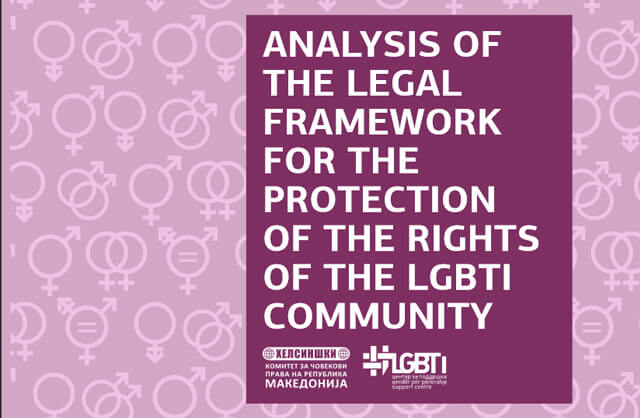The LGBTI Support Centre, supported by an institutional grant under the Civica Mobilitas program, prepared an Analysis of the Legal Framework for LGBTI People.

This analysis gives a brief description of the main problems in the legislation, followed by concrete proposals to overcome them. The analysis is divided into three parts in order to clearly identify the problems without downplaying what has been achieved so far. The first section analyzes the desired legal solutions, such as the adoption of a strategy for overcoming homophobia and transphobia, amendments to the Law on Prevention and Protection against Discrimination, the Criminal Code and Family Law, as well as the adoption of legislation on systematic recognition of sex change. The second section, in order to get an idea of the current legislation regarding LGBTI people, lists the legal provisions and bylaws that mention and regulate rights related to sexual orientation and gender identity. In particular, six laws are covered, the Law on Protection and Prevention of Domestic Violence, the Law on Audio and Audiovisual Media Services, the Law on Public Health, the Law on Amending the Family Law, the Law on Patients’ Rights, the Law on Higher Education, as well as the Rulebook on New Advertising Techniques and the Product Placement Guidelines, adopted by the Agency for Audio and Audiovisual Media Services. Finally, the third section presents international experiences through research and indicators and gives concrete recommendations on how to overcome existing problems and create an atmosphere of acceptance. The analysis applies to all bodies concerned with the protection of citizens’ rights and other non-judicial bodies and matters related to their work. It is intended to inform the public about human rights and freedoms legislation for LGBTI people and can serve as a guide for the legislator in the important reform period ahead.
The contents of this publication are the sole responsibility of the LGBTI Support Centre (Helsinki Committee for Human Rights) and can in no way be taken to reflect the views of Civica Mobilitas, the Swiss Agency for Development and Cooperation (SDC) or the organizations supported by it.



